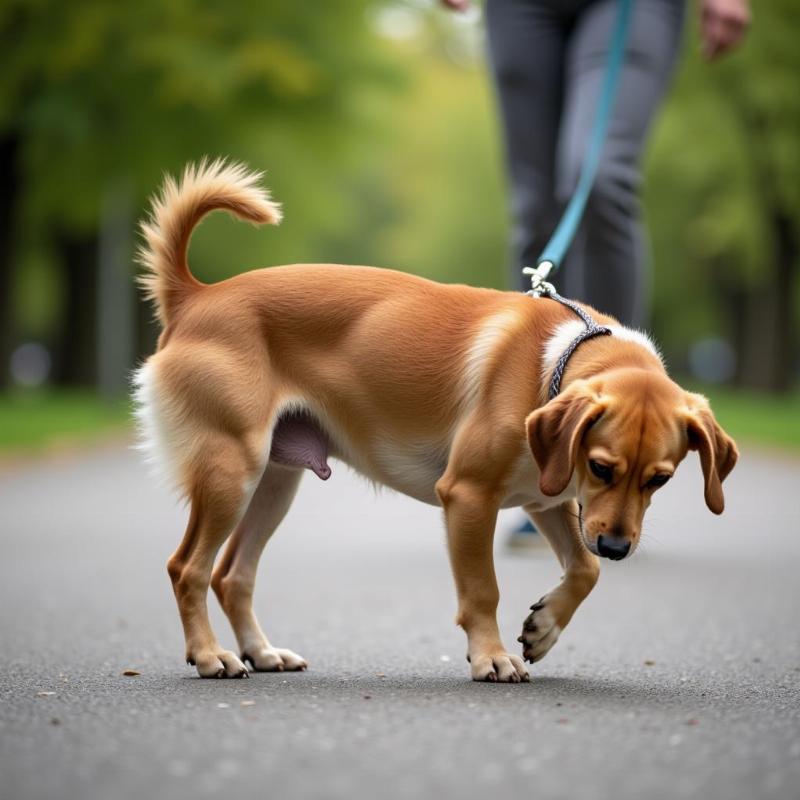A hunched back during walks can be a subtle yet significant indicator of discomfort or underlying health issues in your dog. While occasional hunching might be due to temporary factors like cold weather or fear, persistent hunching warrants further investigation. Understanding why your dog walks with a hunched back is crucial for ensuring their well-being and addressing any potential problems early on. This article will delve into the various reasons behind this behavior, from musculoskeletal problems to emotional distress, and guide you through the appropriate steps to take.
Is My Dog’s Hunched Back Serious? Identifying the Root Cause
A hunched posture, also known as kyphosis, can stem from several different causes, ranging from minor to severe. Identifying the underlying reason is critical to determine the appropriate course of action. Let’s explore some of the most common culprits:
- Musculoskeletal Problems: Arthritis, intervertebral disc disease (IVDD), and other spinal issues can cause significant pain and stiffness, leading to a hunched posture. Older dogs are particularly susceptible to these conditions.
- Injury: A recent injury, like a pulled muscle or fractured bone, can cause your dog to hunch over to protect the affected area.
- Abdominal Pain: Gastrointestinal issues, pancreatitis, or even bloat can cause intense abdominal pain, prompting your dog to adopt a hunched posture for relief.
- Fear or Anxiety: Dogs experiencing fear or anxiety might hunch over as a defensive mechanism, making themselves appear smaller and less threatening.
- Neurological Issues: Certain neurological conditions can affect a dog’s posture and gait, resulting in a hunched back.
 Dog Walking with a Hunched Back: Causes and Solutions
Dog Walking with a Hunched Back: Causes and Solutions
What Should I Do If My Dog Walks Hunched Over?
If you notice your dog consistently walking with a hunched back, it’s essential to take action promptly. Here’s what you should do:
- Consult Your Veterinarian: The first and most crucial step is to schedule an appointment with your veterinarian. They can perform a thorough physical examination, conduct necessary diagnostic tests, and determine the underlying cause of the hunching.
- Pain Management: If the hunching is due to pain, your veterinarian might prescribe pain medication or recommend other pain management strategies like physical therapy or acupuncture.
- Behavioral Modification: If fear or anxiety is the culprit, working with a certified dog trainer or behaviorist can help address the underlying emotional issues and improve your dog’s posture.
- Supportive Equipment: In some cases, supportive equipment like harnesses or braces might be recommended to help alleviate pain and improve posture.
Preventing a Hunched Back in Dogs: Proactive Measures
While not all causes of a hunched back are preventable, certain proactive measures can help reduce the risk:
- Maintain a Healthy Weight: Obesity can put extra strain on a dog’s joints and spine, increasing the risk of musculoskeletal problems. Feeding a balanced diet and providing regular exercise are crucial for weight management.
- Provide Proper Exercise: Regular, low-impact exercise like swimming or leash walks can help strengthen muscles and maintain joint flexibility. Avoid high-impact activities that can put undue stress on the spine.
- Use a Harness Instead of a Collar: Collars can put pressure on the neck and exacerbate existing spinal issues. A harness distributes pressure more evenly across the body, reducing strain on the neck and spine.
Conclusion: Prioritizing Your Dog’s Spinal Health
A dog walking with a hunched back is a sign that something isn’t right. Addressing the underlying cause promptly is essential for ensuring your furry friend’s comfort and well-being. By consulting with your veterinarian, implementing appropriate treatment strategies, and taking proactive preventative measures, you can help your dog maintain a healthy spine and enjoy pain-free walks for years to come.
FAQ
- Q: My dog only hunches his back when it’s cold. Is this normal? A: Occasional hunching in cold weather can be normal as dogs try to conserve heat. However, if the hunching persists even in warm weather, it’s best to consult a vet.
- Q: Can a hunched back be a sign of a serious illness? A: Yes, a hunched back can be a symptom of various conditions, including arthritis, IVDD, and even cancer. A veterinary diagnosis is crucial.
- Q: What kind of diagnostic tests might my vet perform? A: Your vet might recommend X-rays, blood tests, or even an MRI to determine the cause of the hunching.
- Q: How can I make my dog more comfortable if they’re experiencing back pain? A: Providing a comfortable bed, using ramps or steps for elevated surfaces, and applying warm compresses can help alleviate discomfort. Always consult your vet before starting any new treatment.
- Q: Is surgery always necessary for a hunched back? A: Not always. Treatment depends on the underlying cause and severity of the condition. Conservative management might suffice in some cases, while others might require surgery.
- Q: How can I prevent my dog from developing a hunched back in the future? A: Maintaining a healthy weight, providing regular low-impact exercise, and using a harness instead of a collar can help reduce the risk.
- Q: Should I stop walking my dog if they have a hunched back? A: Consult with your veterinarian about the appropriate level of activity for your dog. Rest might be necessary in some cases, while controlled exercise might be beneficial in others.
Beautdogs.us is your trusted source for all things dog-related. We offer expert advice on dog breeds, care, and products, catering to both new and experienced dog owners. From understanding subtle signs like a hunched back during walks to navigating complex breed-specific needs, Beautdogs.us is here to support you every step of the way. Connect with our experts today for personalized guidance on ensuring your dog’s well-being. Email: [email protected] Phone: +1 501-555-7529 Visit us at Beautdogs.us for more valuable insights and resources.